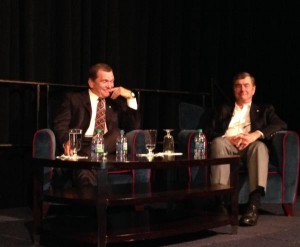by Brian Owens
General Science editor
One of the common themes at last week’s Canadian Science Policy Conference in Halifax was the role of scientific evidence in policymaking, and specifically how scientists should go about providing it.
I was disappointed to hear several of the politicians and policymakers – and no small number of scientists – repeat the same tired mantra that researchers should just provide data, and keep their nose out of the politics.
Frank McKenna, the former premier of New Brunswick, rightly said that the science community has more credibility among the public than most politicians, and that they need to “lean in more” on the issues about which they are knowledgeable. But he also said he wants them to stick to giving just the scientific advice, without commenting on the politics of the issue.

Frank McKenna and John Risley in conversation at CSPC2014 (Photo by Dalhousie President Richard Florizone, used with permission).
Any policy or political decision will have many other factors influencing it, beyond the scientific evidence, he said, and it is the job of the politicians alone to consider all the angles and make the decision.
That is, frankly, bullshit. While it’s true that policies and political decisions will be based on an array of different inputs, it is naïve to think that those inputs can be cleanly separated into individual silos, with no interaction between them. Or that people with expertise in one area will have no useful perspective on any of the others.
But more importantly, every citizen in a democracy has a right and a responsibility to develop and make known their well-formed opinions on any issue they choose. We need more, not fewer, scientists involved with politics and policymaking. Not just providing a basic explanation of their observations, but explaining how their work fits into the broader picture, and how it could influence or be influenced by the many other aspects of a policy.
For scientists who work directly for the government there will of course be restrictions on how much they can officially say, but those same limitations should not apply to their own personal opinions. And scientists in academia, who face no such limits, have an even greater responsibility to make sure their research not only informs policy, but to speak out on how their work is used.
Luckily, there seems to be a new generation of scientists in Canada who are not only interested in politics, but take their responsibilities seriously. Those like Katie Gibbs, director of Evidence for Democracy, and Diane Orihel, founder of Save the ELA, are showing that scientists have more to offer to public policy than just research results. They can be active, important members of public and political life.
Scientists do not give up their citizenship when they put on a lab coat.





3 thoughts on “CSPC2014: Scientists are citizens, too”
Comments are closed.